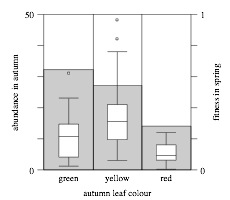A paper by Jennifer R. Ellis and David E. McCauley of Vanderbilt University, just out in Biological Conservation, tries to answer a couple of quite controversial questions for conservationists: 1 How do you prioritize populations for conservation? And when does genetic pollution become genetic rescue? Both answers depend on something most gene-jockeys don’t do much of: growing plants and seeing how they perform.
To add piquancy, the paper deals with a crop wild relative, and a very rare one at that: Helianthus verticillatus, which is known from only four sites in the southeastern United States. The authors worked on populations from two of these, in Tennessee (fewer than 100 individuals) and Alabama (several hundred individuals). They collected seeds from sixteen of what they had previously identified as genetically distinct individuals from each population, and then made a whole bunch of crosses, both within populations and also between the two populations, for two generations. They grew the progeny of these crosses in the same environment and measured how well they did in terms of fruit viability, germination, survival and pollen quality.
So, first, to the prioritization question. Genetic markers are now routinely used to identify populations that are particularly low in diversity and thus in need of immediate in situ protection or collecting for ex situ conservation. Often, genetic diversity is positively correlated with fitness, but this is not always the case. For H. verticillatus, in fact, it was known from previous marker studies that the two populations had comparable levels of genetic diversity and only moderate genetic differentiation. However, the results of the common environment study on the offspring of the intra-population crosses showed that they different significantly in their overall “fitness,” with the Tennessee material having lower germination rates and fruit viability. In other words, molecular markers on their own would not have raised a particular concern about the long-term viability of the Tennessee population. In the words of the authors, “contrary to genetic marker information, these populations are not interchangeable with regard to quantitative fitness characters.”
Next, the genetic rescue question. The conventional wisdom of course is that conservation should strive to maintain the genetic integrity of populations. Bringing in material from elsewhere constitutes genetic pollution and is BAD. The introduction of new genetic material into relatively homogeneous populations with low fitness can of course result in heterosis and increased fitness. But it can also lead to lower fitness — inoutbreeding depression — “owing to the dilution of local adaptations or disruption of co-adapted gene combinations.” Enter the inter-population crosses. Crossing Tennessee individuals with those from Alabama resulted in offspring that were more fit, with no sign of outbreeding depression, at least for the two generations of the study. This “offers great promise” as an active conservation strategy for the Tennessee population, the authors say.
Given people’s sqeamishness about messing around with rare species, I wonder if such activism will be given a chance.
 First off, aphids do avoid red-leaved trees. Archetti counted the number of Dysaphis plantaginea, which commonly lays eggs on apple to overwinter, on trees at Brogdale, the UK’s
First off, aphids do avoid red-leaved trees. Archetti counted the number of Dysaphis plantaginea, which commonly lays eggs on apple to overwinter, on trees at Brogdale, the UK’s